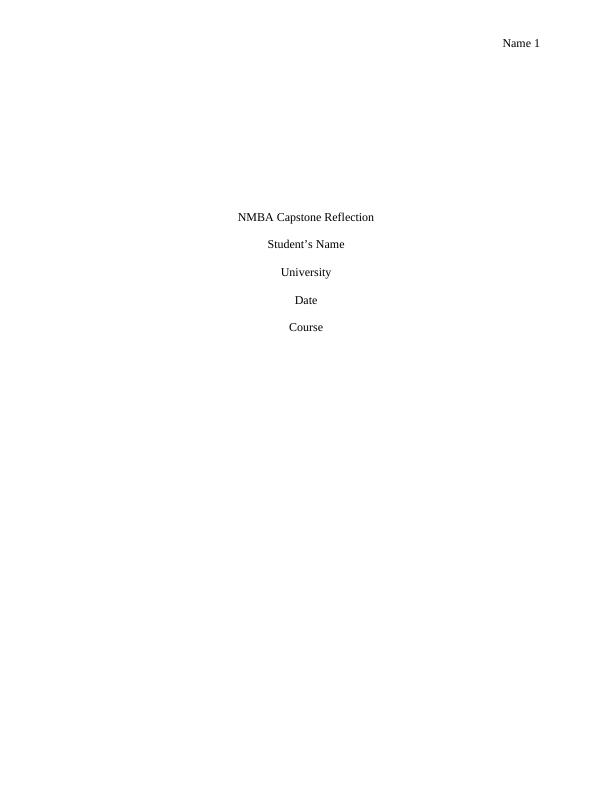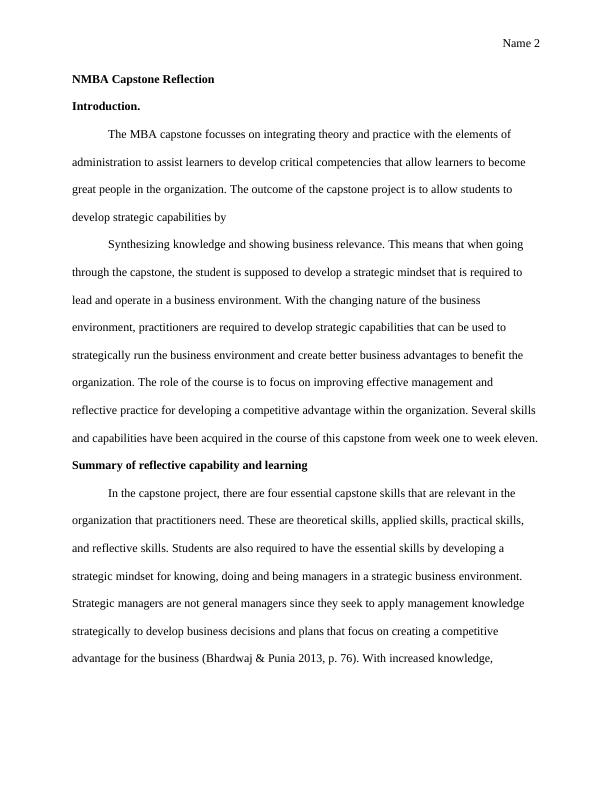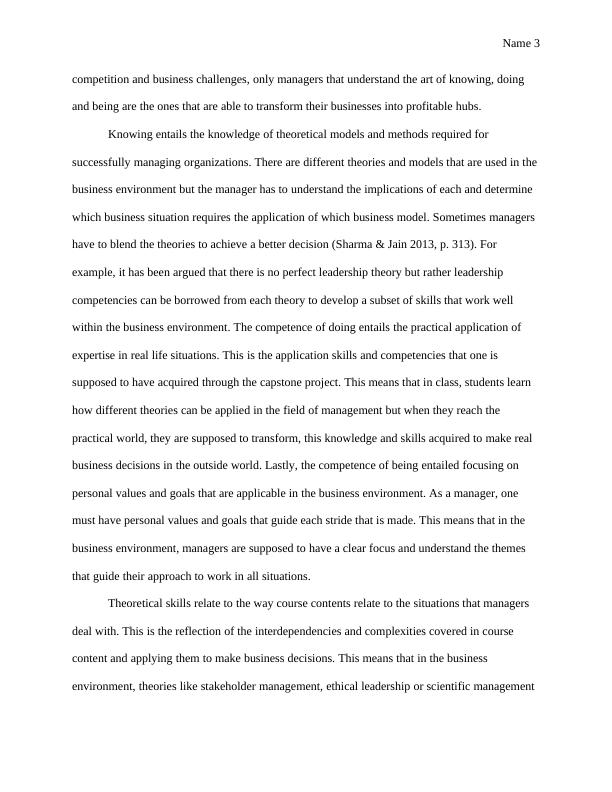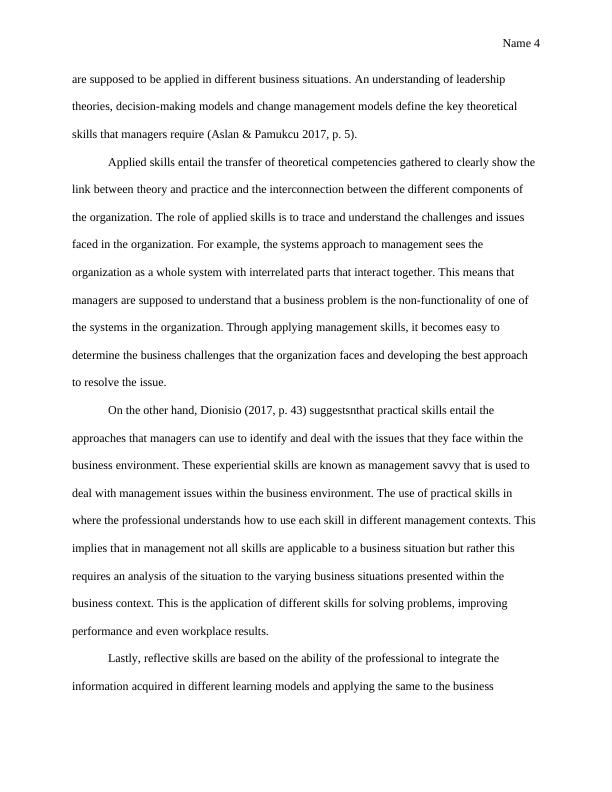NMBA Capstone Reflection
Added on 2023-01-20
11 Pages3281 Words58 Views
Name 1
NMBA Capstone Reflection
Student’s Name
University
Date
Course
NMBA Capstone Reflection
Student’s Name
University
Date
Course

Name 2
NMBA Capstone Reflection
Introduction.
The MBA capstone focusses on integrating theory and practice with the elements of
administration to assist learners to develop critical competencies that allow learners to become
great people in the organization. The outcome of the capstone project is to allow students to
develop strategic capabilities by
Synthesizing knowledge and showing business relevance. This means that when going
through the capstone, the student is supposed to develop a strategic mindset that is required to
lead and operate in a business environment. With the changing nature of the business
environment, practitioners are required to develop strategic capabilities that can be used to
strategically run the business environment and create better business advantages to benefit the
organization. The role of the course is to focus on improving effective management and
reflective practice for developing a competitive advantage within the organization. Several skills
and capabilities have been acquired in the course of this capstone from week one to week eleven.
Summary of reflective capability and learning
In the capstone project, there are four essential capstone skills that are relevant in the
organization that practitioners need. These are theoretical skills, applied skills, practical skills,
and reflective skills. Students are also required to have the essential skills by developing a
strategic mindset for knowing, doing and being managers in a strategic business environment.
Strategic managers are not general managers since they seek to apply management knowledge
strategically to develop business decisions and plans that focus on creating a competitive
advantage for the business (Bhardwaj & Punia 2013, p. 76). With increased knowledge,
NMBA Capstone Reflection
Introduction.
The MBA capstone focusses on integrating theory and practice with the elements of
administration to assist learners to develop critical competencies that allow learners to become
great people in the organization. The outcome of the capstone project is to allow students to
develop strategic capabilities by
Synthesizing knowledge and showing business relevance. This means that when going
through the capstone, the student is supposed to develop a strategic mindset that is required to
lead and operate in a business environment. With the changing nature of the business
environment, practitioners are required to develop strategic capabilities that can be used to
strategically run the business environment and create better business advantages to benefit the
organization. The role of the course is to focus on improving effective management and
reflective practice for developing a competitive advantage within the organization. Several skills
and capabilities have been acquired in the course of this capstone from week one to week eleven.
Summary of reflective capability and learning
In the capstone project, there are four essential capstone skills that are relevant in the
organization that practitioners need. These are theoretical skills, applied skills, practical skills,
and reflective skills. Students are also required to have the essential skills by developing a
strategic mindset for knowing, doing and being managers in a strategic business environment.
Strategic managers are not general managers since they seek to apply management knowledge
strategically to develop business decisions and plans that focus on creating a competitive
advantage for the business (Bhardwaj & Punia 2013, p. 76). With increased knowledge,

Name 3
competition and business challenges, only managers that understand the art of knowing, doing
and being are the ones that are able to transform their businesses into profitable hubs.
Knowing entails the knowledge of theoretical models and methods required for
successfully managing organizations. There are different theories and models that are used in the
business environment but the manager has to understand the implications of each and determine
which business situation requires the application of which business model. Sometimes managers
have to blend the theories to achieve a better decision (Sharma & Jain 2013, p. 313). For
example, it has been argued that there is no perfect leadership theory but rather leadership
competencies can be borrowed from each theory to develop a subset of skills that work well
within the business environment. The competence of doing entails the practical application of
expertise in real life situations. This is the application skills and competencies that one is
supposed to have acquired through the capstone project. This means that in class, students learn
how different theories can be applied in the field of management but when they reach the
practical world, they are supposed to transform, this knowledge and skills acquired to make real
business decisions in the outside world. Lastly, the competence of being entailed focusing on
personal values and goals that are applicable in the business environment. As a manager, one
must have personal values and goals that guide each stride that is made. This means that in the
business environment, managers are supposed to have a clear focus and understand the themes
that guide their approach to work in all situations.
Theoretical skills relate to the way course contents relate to the situations that managers
deal with. This is the reflection of the interdependencies and complexities covered in course
content and applying them to make business decisions. This means that in the business
environment, theories like stakeholder management, ethical leadership or scientific management
competition and business challenges, only managers that understand the art of knowing, doing
and being are the ones that are able to transform their businesses into profitable hubs.
Knowing entails the knowledge of theoretical models and methods required for
successfully managing organizations. There are different theories and models that are used in the
business environment but the manager has to understand the implications of each and determine
which business situation requires the application of which business model. Sometimes managers
have to blend the theories to achieve a better decision (Sharma & Jain 2013, p. 313). For
example, it has been argued that there is no perfect leadership theory but rather leadership
competencies can be borrowed from each theory to develop a subset of skills that work well
within the business environment. The competence of doing entails the practical application of
expertise in real life situations. This is the application skills and competencies that one is
supposed to have acquired through the capstone project. This means that in class, students learn
how different theories can be applied in the field of management but when they reach the
practical world, they are supposed to transform, this knowledge and skills acquired to make real
business decisions in the outside world. Lastly, the competence of being entailed focusing on
personal values and goals that are applicable in the business environment. As a manager, one
must have personal values and goals that guide each stride that is made. This means that in the
business environment, managers are supposed to have a clear focus and understand the themes
that guide their approach to work in all situations.
Theoretical skills relate to the way course contents relate to the situations that managers
deal with. This is the reflection of the interdependencies and complexities covered in course
content and applying them to make business decisions. This means that in the business
environment, theories like stakeholder management, ethical leadership or scientific management

Name 4
are supposed to be applied in different business situations. An understanding of leadership
theories, decision-making models and change management models define the key theoretical
skills that managers require (Aslan & Pamukcu 2017, p. 5).
Applied skills entail the transfer of theoretical competencies gathered to clearly show the
link between theory and practice and the interconnection between the different components of
the organization. The role of applied skills is to trace and understand the challenges and issues
faced in the organization. For example, the systems approach to management sees the
organization as a whole system with interrelated parts that interact together. This means that
managers are supposed to understand that a business problem is the non-functionality of one of
the systems in the organization. Through applying management skills, it becomes easy to
determine the business challenges that the organization faces and developing the best approach
to resolve the issue.
On the other hand, Dionisio (2017, p. 43) suggestsnthat practical skills entail the
approaches that managers can use to identify and deal with the issues that they face within the
business environment. These experiential skills are known as management savvy that is used to
deal with management issues within the business environment. The use of practical skills in
where the professional understands how to use each skill in different management contexts. This
implies that in management not all skills are applicable to a business situation but rather this
requires an analysis of the situation to the varying business situations presented within the
business context. This is the application of different skills for solving problems, improving
performance and even workplace results.
Lastly, reflective skills are based on the ability of the professional to integrate the
information acquired in different learning models and applying the same to the business
are supposed to be applied in different business situations. An understanding of leadership
theories, decision-making models and change management models define the key theoretical
skills that managers require (Aslan & Pamukcu 2017, p. 5).
Applied skills entail the transfer of theoretical competencies gathered to clearly show the
link between theory and practice and the interconnection between the different components of
the organization. The role of applied skills is to trace and understand the challenges and issues
faced in the organization. For example, the systems approach to management sees the
organization as a whole system with interrelated parts that interact together. This means that
managers are supposed to understand that a business problem is the non-functionality of one of
the systems in the organization. Through applying management skills, it becomes easy to
determine the business challenges that the organization faces and developing the best approach
to resolve the issue.
On the other hand, Dionisio (2017, p. 43) suggestsnthat practical skills entail the
approaches that managers can use to identify and deal with the issues that they face within the
business environment. These experiential skills are known as management savvy that is used to
deal with management issues within the business environment. The use of practical skills in
where the professional understands how to use each skill in different management contexts. This
implies that in management not all skills are applicable to a business situation but rather this
requires an analysis of the situation to the varying business situations presented within the
business context. This is the application of different skills for solving problems, improving
performance and even workplace results.
Lastly, reflective skills are based on the ability of the professional to integrate the
information acquired in different learning models and applying the same to the business

End of preview
Want to access all the pages? Upload your documents or become a member.
Related Documents
Personal reflection on skills developed and used in futurelg...
|15
|3513
|306
Reflective Essay Capability and Learninglg...
|14
|3208
|38
Reflection - MBA 600 Capstonelg...
|11
|3296
|43
MBA Capstone Project Workshops: Recommendations and Suggestions for Improving Performance as a Team Memberlg...
|9
|2725
|214
Reflective Essay on MBA Capstone and Skills Developmentlg...
|10
|3391
|249
Reflection on Capstone Business Management Courselg...
|13
|3006
|217